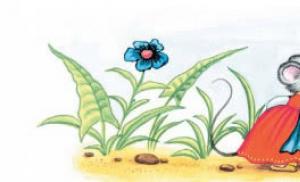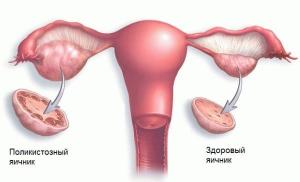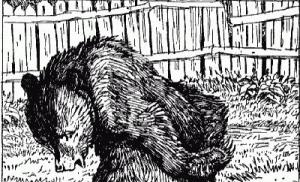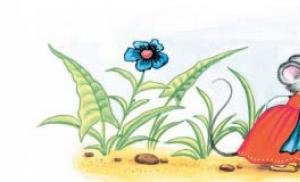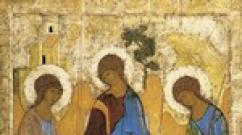Lesson of breakups and Stolz comparative presentation. Oblomov and Stolz
Oblomov and Stolz in the novel by I. A. Goncharov "Oblomov"
Sharp contrasts permeate the entire work of I. A. Goncharov from the first to the last chapter. The reception of antithesis, on which the novel is built, helps to better reveal the characters of the characters, to reveal the author's intention.
About such friends as Ilya Ilyich Oblomov and Andrei Ivanovich Stolz, A. S. Pushkin in his novel in verse “Eugene Onegin” very aptly wrote: “They got along. Water and stone, poetry and prose, ice and fire are not so different from each other.” Indeed, the characters of the characters are so different that many critics agreed: Stolz is a kind of “antidote” to Oblomov. Goncharov wrote: "They were connected by childhood and school - two strong springs." Therefore, looking into the childhood of the heroes, one can understand why such different characters of two friends who lived in the neighborhood were formed.
To learn about the childhood of Ilya Ilyich, the chapter “Oblomov's Dream” helps, which, according to A. V. Druzhinin, was the first step towards finding out the causes of “Oblomovism”. From Oblomov's dream, it becomes clear that everyone loved little Ilyusha, caressed, pampered, so he grew up kind and sympathetic. As soon as Ilya Ilyich just dozes off, he has the same dream: the gentle voice of his mother, her gentle hands, the hugs of relatives and friends ... Each time in a dream, Oblomov returned to a time when he was absolutely happy and loved by everyone. The hero of the novel seems to have escaped from real life into his childhood memories. Ilyusha was constantly protected from all sorts of dangers, real and imagined. The servant Zakhar and “three hundred Zakharov” did everything for the barchon. Such guardianship and care almost completely drowned out in Oblomov any desire to do something himself.
Everyone calls Ilya Ilyich a dreamer. But how could the endless nursery tales about Militris Kirbityevna, about heroes, about sorcerers and firebirds not sow in the soul of a child hope for the best, that all problems will be solved by themselves? These same tales gave rise to Oblomov's fear of life, from which Ilya Ilyich tried in vain to hide in his apartment on Gorokhovaya Street, and then on the Vyborg side.
The complete opposite of Oblomov is Andrei Stoltz. We see throughout the novel a comparison of Stolz and Oblomov, as well as their opposition to each other. They differ literally in everything: externally, by origin (Oblomov is a nobleman, but Stolz is not), by the upbringing and education they received. The reason for these differences lies primarily in education.
Each of the parents made their own special contribution to the upbringing of Andrei Stolz. His father, Ivan Bogdanovich Stolz, a businesslike and practical German, put above all a sense of duty, discipline, responsibility and love for work. He tried to instill these qualities in his son, trying to make him a successful businessman.
Andrei's mother, a Russian noblewoman, on the contrary, "taught him to listen to the thoughtful sounds of Hertz, sang to him about flowers, about the poetry of life ...". Stolz's mother wanted Andrei to grow up as an educated Russian gentleman, and not as a "German burgher", and tried her best to reduce the influence of the Father on Andryusha. In many ways, she wanted to see her son look like Ilya Oblomov and often gladly let him go to Sosnovka, where “an eternal holiday, where they sell work off their shoulders like a yoke.”
Stolz's father, of course, loved Andrei in his own way, but did not consider it possible to show his feelings. The scene of Andrei's farewell to his father is piercing to tears. Ivan Bogdanovich, even at the moment of parting, did not find kind words for his son. Swallowing tears of resentment, Andrei sets off on his journey, accompanied by the lamentations of the servants: “You don’t have a dear mother, there is no one to bless you.” And it seems that it was at this moment that Andrei Stolz, despite all the efforts of his mother, did not leave room for “empty dreams” in his soul. In an independent adult life, he took with him only what he thinks is necessary: prudence, practicality, purposefulness. Everything else remained in distant childhood, along with the image of the mother.
Differences in the characters of the characters explain the difference in aspirations and beliefs. You can learn about this from the story of Ilya Ilyich about his ideal life. Most of all, Oblomov longs for peace, carelessness and tranquility. But Ilya Ilyich considered peace not the result of vigorous activity, not a reward for it, but a constant, the only possible and correct state of a person. Arguing with Stolz, Oblomov convinced him that "the goal of all ... running around is ... this is the dressing of peace, the desire for the ideal of the lost paradise." Therefore, why work, do anything, if you still come to what Oblomov always wanted to have?
And for Stolz, the main thing is work. But for Andrey, work is not a way to achieve peace, any desire for which Stoltz called "Oblomovism." Labor for him is “the image, content, element and purpose of life”.
If Oblomov was not accustomed to work, he dreamed of achieving everything without it (as in a nanny's fairy tale: “waved a magic wand” - and “everything is ready”), then Stolz was brought up from childhood by work, which was the goal of his father's life. Over time, Andrei simply stopped even thinking about existence without activity.
The attitude of friends to the bustle of the capital is also different. Stolz was already accustomed to it and felt in the light, "like a fish in water." He sees everything, but prefers to turn a blind eye to his shortcomings. Andrei does not allow society to encroach on his innermost feelings and thoughts, as if closing himself off from him with courteous behavior.
And Ilya Ilyich, having served himself and carefully listening to the stories of visitors - Sudbinsky, Penkin, Volkov - about life in the capital, he realized that it was too empty (“What is there to look for? Interests of the mind, heart?”) And fussy (“In ten places in one day!?"). Ilya Ilyich did not see the point in all these visits, going to work, balls.
From the characters, upbringing and beliefs, the lifestyle that the main characters of the novel lead is formed. He left some imprint on the appearance of the characters. Oblomov - a man with surprisingly soft features - was much thicker than Stolz and "flabby beyond his years", and Andrei Ivanovich was "all made up of bones, muscles and nerves", thin, as befits a person leading an active lifestyle.
Stolz was accustomed from childhood to activity, to the fact that time is precious and should not be wasted. And so Andrei's whole life passed in perpetual motion, which, however, cannot be called vanity. He was not just in constant dynamics, but benefited himself and others. But, despite the constant employment, he "goes into the world and reads: when he has time - God knows." Stoltz wanted to inspire Oblomov to such a life, for whom, despite a lot of free time, nothing was done. Oblomov spent most of his life on the couch, since “lying with Ilya Ilyich ... was a normal state.” His ideal was a carefree life in unity with nature, family and friends, in dreams of which Oblomov spent years.
The attitude of the characters to love was expressed in the novel through feelings for Olga Ilyinskaya.
Oblomov wanted to see in Olga a loving woman, capable of creating a serene family life, kind and gentle, like his mother. The girl was at first in love with Ilya Ilyich, she liked his touching naivety, “pigeon tenderness” and kind heart. And Oblomov himself was in love with Olga. But, as usual, hoping that everything would happen by itself, he did not take any action to ensure that Olga became his wife. His "vile habit of getting satisfaction of his desires ... from others" played a fatal role in this situation: Olga preferred Oblomov's uncertainty, expectation and inaction to a firm and reliable marriage with Stolz.
Stolz, who knew Ilyinskaya almost from early childhood, felt love and friendship for her. There were no fiery passions, “burning joys” or disappointments in her. Even jealousy for an unknown opponent did not cause a storm of emotions in Stolz's soul. And when he found out that this opponent was Oblomov, he became “calm and cheerful” at all. Stoltz saw in Olga a faithful friend and comrade-in-arms in labor and therefore tried to instill in her an active principle, the ability to fight, to develop her mind.
And Olga fell in love with Andrey not suddenly. The description of her character immediately suggests that Olga Ilyinskaya cannot but become Olga Sergeevna Stolz.
The love between Olga and Andrey was born and began to grow without “stormy ups and downs”. After the wedding, she did not disappear, but continued to live, however, without development, smoothly and measuredly (“they had everything in harmony and silence”).
From a comparison of the two heroes, it can be seen that Oblomov and Stolz are completely different heroes. What was the basis of such a strong and faithful friendship between them? It seems to me that this is not only childhood and school, as Goncharov wrote. Stolz and Oblomov complement each other.
Goncharov wanted to reflect in Ilya Ilyich the typical features of the patriarchal nobility, and Stolz was assigned the role of a person capable of breaking the “Oblomovism”. But, after reading the novel, I could not imagine the characters so unambiguous. The personality of Ilya Ilyich evokes conflicting feelings: regret for his helplessness and sympathy, because Oblomov has absorbed the contradictory features of the Russian national character, many of which are close to each of us.
Modern life requires "Stoltsev", and they certainly appear. But Russia will never consist only of such characters. Russian people have always been distinguished by the breadth of nature, the ability to sympathize, a lively and quivering soul. I really want the practical qualities of Stolz and the “pure as crystal” soul of Oblomov to unite in modern man.
Description of the presentation on individual slides:
1 slide
Description of the slide:
2 slide
Description of the slide:
3 slide
Description of the slide:
Oblomov and Stolz Friends-antipodes. Despite the difference in characters, friends were relentlessly attracted to each other. Next to Stolz - reasonable, pragmatic, firmly on the ground, Oblomov felt calmer and more confident. But Stolz himself needed Ilya Ilyich even more. “Often, breaking away from business or from the secular crowd, from the evening, from the ball,” he “went to sit on Oblomov’s wide sofa” in order to “take away and calm an anxious or tired soul in a lazy conversation.” And it was every time like a return to childhood, in which Oblomov's parents loved the German boy and little Andrey spoiled Ilyusha, "either suggesting lessons to him, then doing translations for him", it was every time a return to the "lost paradise", which he yearns for not only the dreamy Oblomov, but also the active Stolz.
4 slide
Description of the slide:
5 slide
Description of the slide:
Andrey Ivanovich Stolz "Stolz" (German: Stolz) - proud "Andrey" - brave, courageous "He is all made up of bones, muscles and nerves ..." "... he was not devoured by the remorse of a weary heart; he didn’t get sick with his soul ... ”(ch. 2, part II) The meaning of the name Stolz strengthens the opposition of two heroes: the meek and gentle Ilya - the stubborn and unbending Andrei
6 slide
Description of the slide:
Andrey Ivanovich Stolz - Why did Goncharov and critics think that the author did not succeed in the image of Stolz? Do you agree with this?
7 slide
Description of the slide:
Andrei Ivanovich Stolz A.P. Chekhov (1889) wrote: “Stolz does not inspire any confidence in me. The author says that this is a magnificent fellow, but I do not believe it. This is a swindling beast who thinks very well of herself and is pleased with herself ... "
8 slide
Description of the slide:
Andrey Ivanovich Stolz Stolz learned how to comfortably and practically settle in life. His ideal is comfort and material well-being, Stolz is an egoist, lives only for himself. He dreamed of devoting his life to a useful cause that is necessary for Russia, but subsequently he does not have high aspirations. Stolz could not save his friend, because. does not complete the matter, like Oblomov Before difficulties and Stolz gives in: “... we will not go with Manfreds and Fausts to a daring fight against rebellious issues, we will not accept their challenge, bow our heads and humbly wait out a difficult moment ...” Another version of Oblomovism , and the worst, because at Stolz she is stupid and self-satisfied. The tragedy of Stolz is in his unnaturalness, artificiality Family happiness obscured Stolz's entire business life. They lived "like everyone else, as Oblomov dreamed", they reached the "norm of love", which he spoke about. Guided by true love, Stolz comes to the Oblomov ideal, i.e. all true love leads, according to the author, to a calm, quiet life, no matter how stormy its achievement may be.
9 slide
Description of the slide:
10 slide
Description of the slide:
Andrei Ivanovich Stolz A friend of Ilya Ilyich Oblomov, the son of Ivan Bogdanovich Stolz, a Russified German who manages an estate in the village of Verkhlev, five miles from Oblomovka. Stoltz was only half German, according to his father: his mother was Russian: he professed the Orthodox faith; his natural speech was Russian: he learned it from his mother and from books, in games with village boys and in the university auditorium. He inherited the German language from his father and from books.
11 slide
Description of the slide:
Education and upbringing Ivan Bogdanovich Stolz - manager of the estate in the village of Verkhlev
12 slide
Description of the slide:
Education and upbringing Stolz received a specific education: “From the age of eight, he sat with his father at a geographic map, sorted through the warehouses of Herder, Wieland, Bible verses and summed up the illiterate accounts of peasants, bourgeois and factory workers, and read sacred history with his mother, taught Krylov’s fables , dismantled the warehouses of Telemachus. Upbringing, like education, was ambivalent: dreaming that a “good bursh” would grow out of his son, the father in every possible way encouraged boyish fights, without which the son could not do a day, the disappearance of the child for half a day and more with unknown goals to unknown places. If Andrey appeared without a lesson prepared “by heart”, Ivan Bogdanovich sent his son to where he came from, and every time young Stoltz returned with the lessons he had learned. Stolz's mother, on the contrary, strove to raise a true gentleman, a decent, clean boy with curled curls - "in her son she saw the ideal of a gentleman, albeit an upstart, from a black body, from a burgher father, but still the son of a Russian noblewoman." From this bizarre combination, the character of Stolz was formed. Ivan Bogdanovich Stolz - manager of the estate in the village of Verkhlev
13 slide
Description of the slide:
14 slide
Description of the slide:
The character of Stolz Stolz from an early age was taught by his father not to count on anyone for anything. He wants to do everything at the same time: he is equally interested in commerce, travel, writing, public service. Parting with his father, who sends him from Verkhlev to St. Petersburg, Stolz says that he will certainly follow his father's advice and go to an old friend of Ivan Bogdanovich Reingold - but only when he, Stolz, will have a four-story house like Reingold's. Such independence and independence, as well as self-confidence, are the basis of the character and worldview of the younger Stolz, which his father so ardently supports and which Oblomov lacks so much.
15 slide
Description of the slide:
16 slide
Description of the slide:
Stolz's element is constant movement. In his thirties, he feels good and at ease only when he feels his need at once in all parts of the world. “He is all made up of bones, muscles and nerves, like a blooded English horse. He is thin; he has almost no cheeks at all, that is, there is bone and muscle, but no sign of fatty roundness; the complexion is even, swarthy and no blush; eyes, although a little greenish, but expressive. The most important thing in Stolz’s character is that “just as he has nothing superfluous in his body, so in the moral administration of his life he was looking for a balance of practical aspects with the subtle needs of the spirit.”
17 slide
Description of the slide:
“... A dream, mysterious, mysterious had no place in his soul ... He had no idols, but he retained the strength of his soul, the strength of his body, but he was chastely proud, he exuded some kind of freshness and strength, before which they were involuntarily embarrassed and unshy women. Such a human type, both in real life and in literary incarnation, always carries something ambiguous: its positivity seems to be undeniable, but many things make you resist emerging sympathies, especially since one of the important components of Stolz's philosophy is to achieve the goal in any way, despite the obstacles (“he put perseverance in achieving goals above all else”).
18 slide
Description of the slide:
19 slide
Description of the slide:
A life. Purpose: Perception: Principles: Love: Friendship: Relationships with others: Most feared
20 slide
Description of the slide:
A life. Purpose: "labor is the image, content, element and purpose of life, at least mine." Perception: life is happiness in work; life without work is not life; “…“life touches!” "And thank God!" Stoltz said. Principles: to have a “simple, that is, direct, real outlook on life - that was his constant task ...”, “Above all, he put perseverance in achieving goals ...”, “... will measure the abyss or wall, and if there is no sure means to overcome, he will leave." Love. Stolz loved not with his heart, but with his mind, in every movement of his soul and heart he looked for a rational explanation. Therefore, even in his youth, “among passions, I felt the ground under my feet,” since everywhere I searched for intelligence, and not passion. However, he did not deny this feeling: “he developed a conviction that love, with the power of the Archimedean lever, moves the world; that there is so much universal, irrefutable truth and goodness in it, as there are lies and ugliness in its misunderstanding and abuse. Friendship. Stolz always and everywhere had a lot of friends - people were drawn to him. But he felt closeness only to people-personalities, sincere and decent. Indeed, he did not have so many real friends, such as Ilya Ilyich and Olga Sergeevna. Relationships with others. Everyone knows him, he knows everyone. He leaves no one indifferent to him - he is either respected and appreciated or feared and hated. Most of all he was afraid of what was incomprehensible or inaccessible to him, and bypassed it in every possible way: from passions to imagination; but at every opportunity he tried to find the key to this, as yet incomprehensible.
21 slide

























1 of 25
Presentation on the topic: Stolz and Oblomov
slide number 1

Description of the slide:
slide number 2

Description of the slide:
slide number 3

Description of the slide:
Key questions: - Why didn't the author depict Oblomov's miraculous transformation? - How can one help a person achieve harmony with life, learn not to hide, but to open to the world all his intellectual and spiritual wealth? What needs to be done to help a person overcome apathy and return to a full life again? - What did Stoltz intend to do in order to save his friend? To what end did he come? - Why such noble spiritual impulses of Stolz did not lead to the expected result.
slide number 4

Description of the slide:
Was the author right in believing that it was precisely such a person as Stolz who was able to save Oblomov? - Could such a person as Stolz awaken Oblomov's soul? - What features did the author endow Andrei Stolz with? Is it possible to consider that the image of Stolz is strictly opposed to the image of Oblomov? Compare the author's description of the way of life of Oblomov and Stolz. 1. How are Oblomov and Stolz opposed to each other? 2. What brings Oblomov and Stolz together?
slide number 5

Description of the slide:
“Oblomov, a nobleman by birth, a collegiate secretary with rank, has been living without a break for the twelfth year in St. Petersburg” (1, V). “Ilya Ilyich’s lying down was neither a necessity, like a sick person or a person who wants to sleep, nor an accident, like someone who is tired, nor a pleasure, like a lazy person: this was his normal state” (1.1 ). “Stolz is the same age as Oblomov: and he is already over thirty years old ... He is constantly on the move ...” (2, II) “Stolz was only half German, according to his father; his mother was Russian; he professed the Orthodox faith; his natural speech was Russian...” (2.1) “He walked firmly, cheerfully; lived on a budget, trying to spend every day, like every ruble, with every minute, never dormant control of wasted time, labor, strength of soul and heart. It seems that he controlled both sorrows and joys like the movement of his hands, like the steps of his feet, or how he dealt with bad and good weather ”(2, II).
slide number 6

Description of the slide:
“He kept getting ready and getting ready to start life, kept drawing in his mind the pattern of his future; but with each year that flashed over his head, he had to change and discard something in this pattern. Life in his eyes was divided into two halves: one consisted of work and boredom - these were synonyms for him; the other - from peace and peaceful fun "(1, V). “But he himself walked and walked stubbornly along the chosen path. They did not see him ponder over something painfully and painfully; apparently he was not devoured by the pangs of a weary heart; he did not get sick with his soul, he never got lost in complex, difficult or new circumstances, but approached them as if he were former acquaintances, as if he lived a second time, passed familiar places ”(2, II). 1. Oblomov has been living in the same city for more than 12 years without a break, and his main occupation is lying down; Stolz is "constantly on the move." Oblomov was just getting ready and preparing to start life, Stolz "was walking and walking stubbornly along the chosen road." Oblomov was just creating in your imagination a picture of the future life; Stolz did everything deliberately and confidently, “as if he lived a second time.” 2. Oblomov and Stolz are peers, belong to the same social stratum.
slide number 7

Description of the slide:
Oblomov and Stolz: relationship with parents -Compare the nature of the relationship between Oblomov and Stolz with their parents. 1. How are Oblomov and Stolz opposed to each other? (1, IX, 1, IX, 2,1) 2. What brings Oblomov and Stolz together? 1. Oblomov almost did not know male education; Stolz's father, on the contrary, strove to make a real man out of his son, he was a supporter of harsh methods of education and did not allow his wife to interfere with his communication with Andrei with pity and excessive care. 2. Both Oblomov and Stolz fondly remember their mothers, unable to hold back their tears. Their mothers - an example of tenderness, caring - cherished their sons, sought to protect them from dangers, could not stop looking at their children.
slide number 8

Description of the slide:
Oblomov and Stolz: attitude to teaching -Compare the information about the attitude to the teaching of Oblomov and Stolz. How are Oblomov and Stolz opposed to each other? (1, VI ;2,1) 2. What brings Oblomov and Stolz together? 1. Oblomov studied involuntarily, not understanding why this punishment was prepared for him and why he needed this knowledge in life; parents sought to protect their son from hard teaching. Stolz's education was led by his father, gave him responsible assignments and asked him how he would from an adult. Stolz studied well. And soon he began to teach. 2. Both Oblomov and Stolz were provided with the necessary conditions for teaching. They both received a good education, and studied together for many years.
slide number 9

Description of the slide:
Oblomov and Stolz: attitude towards service and society. -Compare the information about the attitude of Oblomov and Stolz to the service and role in society. 1. How are Oblomov and Stolz opposed to each other? (1, V; 2, II) 2. What brings Oblomov and Stolz together? 1. Oblomov was alien to the lifestyle that the service demanded from him, as well as the vanity and noise of secular life; he successfully isolated himself from them. Stolz felt confident both in the service and in the world, but he never attached much importance to this. Oblomov does not happen in the world; Stolz, despite his busyness, manages to appear in secular society. 2. Neither Oblomov nor Stolz believed that service or secular society was of particular importance in their lives. Both Oblomov and Stolz are retired.
slide number 10

Description of the slide:
Oblomov and Stolz: understanding of love - Compare the nature of the experiences of Oblomov and Stolz in love - How are Oblomov and Stolz opposed to each other? (2,X; ,XI; 3,VI; 4,IV; 4,VII). 1. For Oblomov, love is a shock, a disease, it gives him mental and physical suffering. For Stolz, love is the work of the mind and soul. 2. Both Oblomov and Stolz are gifted with the ability to love deeply, sincerely.
slide number 11

Description of the slide:
Conclusion. The author characterizes Stolz as a bright, attractive personality; if Oblomov is lazy, inactive, good-natured, harmless, sensitive, capable of a spiritual impulse, indecisive, then Stolz is active, active, kind, benevolent, focused on his goal, immersed in thought, prudent, prudent, quickly makes decisions. The images of Oblomov and Stolz are opposed both in terms of upbringing, and in relation to teaching, and in terms of the perception of love ... However, it cannot be said that a strict opposition lies at the basis of the comparison of these images. The author presented the reader with two bright personalities, the inner world of which is not limited to mutually exclusive characteristics. He draws the reader's attention to the fact that these characters are brought together by their deep attachment to their mother, memories of childhood and youth, the ability to deeply and sincerely love. Obviously, Stolz is exactly the person who could awaken Oblomov's soul.
slide number 12

Description of the slide:
Maybe Oblomov was afraid to trust Stolz? - What kind of relationship did Oblomov and Stolz have? Write out the words, phrases of the text that the author characterizes the relationship between Oblomov and Stolz. (I, III; 2, II) Oblomov and Stolz were connected not only by common pages of biography. They cherished each other, were always happy to meet, knew how to appreciate the best qualities and be indulgent to each other's weaknesses. Their relationship is a deep emotional attachment, sincere heartfelt feelings. Oblomov and Stolz needed each other and were grateful to fate for sending them each other. Oblomov trusted Stoltz, believed that he could help him, expected help from him.
slide number 13

Description of the slide:
Maybe Stoltz made a mistake in choosing the means to save his friend? - Did Stoltz choose the right means to realize his plan? Stolz, it would seem, calculated everything correctly. Love is a feeling that causes the strongest shocks. If there are still living feelings in the soul of a person, love will not allow them to doze off. Stolz was sure that Olga would charm Oblomov. - Were Stolz's expectations justified? Oblomov and Olga: the awakening of love




“Ah, Ilya, Ilya! .. No, I will not leave it like that. In a week you won't recognize yourself. Already in the evening I will give you a detailed plan of what I intend to do with myself and with you, and now get dressed. Wait, I'll shake you..." (2, III) "I'll try to lift you, maybe for the last time. If after that you continue to sit here with Tarantiev or Alekseev, then you will completely disappear, you will become a burden even to yourself. Now or never!” (2, IV) “I won’t leave you like this, I’ll take you away from here, first abroad, then to the village: you will lose weight a little, stop moping, and then we’ll find the case ...” (2, IV) “... What with you?.. You know me: I have long given myself this task and will not back down. So far I have been distracted by various things, but now I am free. You must live with us, close to us: Olga and I have decided so, and so it will be ... Let's go! .. I am ready to take you by force! You have to live differently, you understand how...” (4, IX)



Could a man like Stolz awaken Oblomov's soul? Having met Oblomov, having formed an idea of his individuality and personal qualities, we can also assume what a person should be like so that he can awaken Oblomov's soul. This should be a person, in terms of personality, in spiritual qualities equal to Oblomov, whom Oblomov trusts, close, dear to his heart.



Lifestyle Lifestyle Differences Similarities Oblomov has been living in the same city for more than 12 years, and his main occupation is lying; Stolz is "constantly on the move." Oblomov was just getting ready and preparing to start life, Stolz "was walking and walking stubbornly along the chosen road." Oblomov was just creating in his imagination a picture of the future life; Stolz did everything deliberately and confidently, "as if he lived a second time." Oblomov and Stolz are the same age, belong to the same social stratum

Relations with parents Oblomov almost did not know male education; Stolz's father, on the contrary, strove to make a real man out of his son, he was a supporter of harsh methods of education and did not allow his wife to interfere with his communication with his son with pity and excessive care. Both Oblomov and Stolz fondly remember their mothers, unable to hold back their tears. Their mothers, an example of tenderness, caring, valued their sons, sought to protect them from dangers, could not stop looking at their children.

Oblomov studied involuntarily, not understanding why this punishment was prepared for him and why he needed this knowledge in life; parents sought to protect their son from hard teaching. Stolz's education was led by his father, gave him responsible assignments and asked him like an adult. Stolz studied well. And soon he began to teach. Both Oblomov and Stolz were provided with the necessary conditions for teaching. They both received a good education, and studied together for many years.

Attitude towards service and society Oblomov was alien to the lifestyle that the service demanded from him, as well as the vanity and noise of secular life; he successfully isolated himself from these areas of life. Stolz felt confident both in the service and in the world, but he never attached much importance to this. Oblomov does not happen in the world; Stolz, despite his busyness, manages to appear in secular society. Neither Oblomov nor Stolz believed that service or secular society was of particular importance in their lives. Both Oblomov and Stolz are retired.


Conclusion The author characterizes Stolz as a bright, attractive personality; if Oblomov is lazy, inactive, good-natured, harmless, sensitive, capable of a spiritual impulse, indecisive, then Stolz is active, active, kind, benevolent, focused on his goal, immersed in thought, prudent, prudent, quickly makes decisions.

The images of Oblomov and Stolz are opposed both in terms of upbringing, and in relation to teaching, and in terms of the perception of love ... However, it cannot be said that the comparison of these images is based on a strict opposition. The author presented the reader with two bright personalities, the inner world of which is not limited to mutually exclusive characteristics. He draws the reader's attention to what these characters have in common: a deep attachment to their mother, memories of childhood and adolescence, the ability to love deeply and sincerely. It is obvious that Stolz is exactly the person who could awaken Oblomov's soul.


The nature of the relationship between Oblomov and Stolz “There was one person in his heart (Oblomov): he also did not give him rest; he loved news, and the world, and science, and all his life, but somehow deeper, sincere, and Oblomov, although he was affectionate with everyone, he sincerely loved him alone, believed him alone, perhaps because he grew up, studied and lived with him. This is Andrey Ivanovich Stolz” (1, III).

“How could such a person be close to Oblomov, in whom every feature, every step, the whole existence was a blatant protest against the life of Stolz? It seems that the question has already been settled, that opposite extremes, if they do not serve as a pretext for sympathy, as was thought before, then in no way prevent it.

Moreover, they were connected by childhood and school by two strong springs, then Russian, kind, fat caresses, abundantly wasted in the Oblomov family on a German boy, then the role of a strong one, which Stoltz occupied under Oblomov both physically and morally, and finally, and more of everything, at the base of Oblomov's nature lay a pure, bright and kind beginning, filled with deep sympathy for everything that is good and that only opened up and responded to the call of this simple, uncomplicated, eternally trusting heart.

Andrei often, breaking away from business or from the secular crowd, in the evening, from the ball, went to sit on Oblomov’s wide sofa and, in a lazy conversation, take away and calm an anxious or tired soul, and always experienced that calming feeling that a person experiences when coming from magnificent halls under his own a modest shelter or returning from the beauties of southern nature to a birch grove, where he walked as a child ”(2, II).

Conclusion It is obvious that Oblomov and Stolz were connected not only by common biography pages. They cherished each other, were always happy to meet, knew how to appreciate the best qualities and be indulgent to each other's weaknesses. Their relationship is a deep emotional attachment, sincere heartfelt feelings. Oblomov and Stolz needed each other and were grateful to fate for sending them each other. Oblomov trusted Stoltz, believed that he could help him, expected help from him.

Homework According to the text of chapters 2, V; 2, VI; 2, VIII; 2, IX; 2, X compose a composition on the topic: “Oblomov and Olga: the awakening of love”; According to the text of chapters 3.1; 3, W; 3, IV; 3, VII; 3, VIII; 3, XI; 3, XII; 4, VI compose a composition on the theme "Oblomov and Olga: unfulfilled dreams"; Prepare a message on the topic “The love story of Stolz and Olga” (chapters 2, V; 4, IV; 4, VIII); Prepare a message on the topic “Oblomov and Agafya Matveevna” (chapters 3, II; 3, W; 3, VI; 4.1; 4, IX; 4, X).

To use the preview of presentations, create a Google account (account) and sign in: https://accounts.google.com
Slides captions:
I.A. Goncharov "OBLOMOV"
STOLZ OBLOMOV
Andrey Ivanovich Stolz “He was all made up of bones, muscles and nerves, like a blooded English horse. He is thin; he has almost no cheeks at all, that is, there is bone and muscle, but no sign of a fat circle; the complexion is even, swarthy and no blush; eyes, although a little greenish, but expressive.
Life on the estate had a huge impact on Ilya Ilyich. It was she who determined the poetic beginning in his character, his ideas about family life. The hero strives for a spiritual life that develops around family and love. A man whose soul is “pure and clear as glass”, “noble and gentle”, Oblomov does not accept the world of a limited and soulless society and in his own way (passively) resists it.
Education and upbringing. Upbringing, like education, was ambivalent: dreaming that a “good bursh” would grow out of his son, the father encouraged boyish fights in every possible way. If Andrey appeared without a lesson prepared “by heart”, Ivan Bogdanovich sent his son to where he came from, and every time young Stoltz returned with the lessons he had learned. Stolz's mother, on the contrary, strove to raise a true nobleman, a decent, clean boy with curly curls - "in her son she saw the ideal of a gentleman, albeit an upstart, from a black body, from a burgher father, but still the son of a Russian noblewoman." From this bizarre combination, the character of Stolz was formed.
Normal state He was wearing a dressing gown made of Persian fabric, a real oriental dressing gown, without the slightest hint of Europe, without tassels, without velvet, without a waist, very roomy, so that Oblomov could wrap himself in it twice ... Lying down at Ilya Ilyich was not a necessity like a sick person or like a person who wants to sleep, neither by chance, like someone who is tired, nor by pleasure, like a lazy person: this was his normal state ... "
Ilya Ilyich Oblomov Psychological portrait of the hero “He was a man of thirty-two or three years old, of medium height, pleasant appearance, with dark gray eyes, but the absence of any definite idea, any concentration in facial features. The thought walked like a free bird across the face, fluttered in the eyes, settled on half-open lips, hid in the folds of the forehead, then completely disappeared, and then an even light of carelessness glimmered in the whole face ... "
Stolz's element is constant movement. In his thirties, he feels good and at ease only when he feels his need at once in all parts of the world. The most important thing in Stolz’s character is that “just as he has nothing superfluous in his body, so in the moral administration of his life he was looking for a balance of practical aspects with the subtle needs of the spirit.”
Oblomov and Stolz Despite the difference in characters, friends were relentlessly attracted to each other. Next to Stolz - reasonable, pragmatic, firmly on the ground, Oblomov felt calmer and more confident. But Stolz himself needed Ilya Ilyich even more.
Oblomovism in the novel In the context of the novel, Oblomovism is interpreted in different ways. In the social aspect, on the one hand, this is a manifestation of the vices of serfdom, landlord life. On the other hand, it is a national phenomenon that can be viewed from the standpoint of the Russian national character. However, Oblomovism is also a psychological phenomenon characteristic of people of a certain psychological type. Combining these aspects, Oblomovism illustrates "escape from reality", life in an illusory world, a conscious rejection of vital activity.
On the topic: methodological developments, presentations and notes
Presentation for the lesson of literature, grade 11, topic "Russian literature of the late XIX - early XX century. Traditions and innovation."
The presentation will help the teacher to illustrate the lecture on the topic "Russian literature of the late XIX - early XX century." The material contains the main theses, photos....
Presentation for the lesson of literature in grade 9 "Literature of the 18th century. Classicism. Russian classicism."
One of the first teaching lectures on literature in grade 9. The teacher's story is accompanied by slides with text so that students can write down the main without fuss. The lecture is designed for 30-40 minutes, depending on...
Section VIII of the Literature Work Program, Grade 5 Electronic application. Presentations for literature lessons in grade 5, 1 quarter. Electronic application to the work program
Presentations help the teacher to present the material being studied more vividly, clearly and easily, to acquaint students with biographical data, features of the work of poets, writers....
